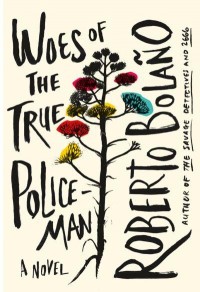 Woes of the True Policeman
Woes of the True Policeman
by Roberto Bolaño
Farrar, Straus and Giroux, 2012
256 pages / $25.00 buy from Amazon
1. I don’t want to believe this is a draft of works that were to come later.
2. And yet its opening section appears word-for-word in The Savage Detectives.
3. I’ve read over and over that Bolaño worked on this book from the 1980s up to his death in 2003. The endnote (which comes abruptly) suggests he was serious enough about it to have revised a couple of times by hand, on an electric typewriter, and on a computer. There were also two physical manuscript versions. Parts of all of these were pieced together to create this book. This corresponds with other accounts of trying to bring his posthumous work into order. I remember reading somewhere that he first wrote the name “Arcimboldi” in the late 1980s.
4. Reading that distressed me. All I could think about on the way to work later, looking at the sidewalk, was whether whoever wrote that had meant “Arcimboldi” or “Archimboldi.”
5. In 2666, we get the life story of Benno von Archimboldi, whom no one in the literary world has ever seen, and to the search for whom the entire first section is devoted. The Critics read his books constantly, sometimes over and over again as if they’re becoming ill or desperate, but with the exception of the book that makes Lotte Reiter realize that Archimboldi is her brother, we don’t get much of an idea of the novels’ content. He is a giant pacing around in the desert, upsetting animals and stones and cacti with his footfalls’ vibrations.
6. A whole section of Woes is devoted to the works and certain biographical details (friendships, hobbies, epistolary relationships, feuds) of J.M.G. Arcimboldi. One oblique reference to his disappearance is made in the book. But he is still overwhelmingly the man who’s not there.
7. I’ve drawn out the same triangle over and over again: Benno von Archimboldi–J.M.G. Arcimboldi–J.M.G. Arcimboldi (Savage Detectives). Then I stare at it, scratch my chin or suck at coffee, and wonder: what does “J.M.G” stand for? why drop the “h” (or add the “h”?)? are the two Arcimboldis the same?–only The Endless Rose appears in both of their bibliographies–is this a play on the fact that Italian artist seems to have gone by Arcimboldo and Arcimboldi? and, for that matter, is there any real connection to the painter? the fragmented man? the man made of whatever can be gleaned from the world around him? Why are the Arcimboldis French, and Archimboldi is a Prussian who writes novels that are distinctly French, Polish, and American?
8. Then there’s Lalo Cura, to whom I had been imagining the title referred to since I first saw it. He has a “prefiguration” in a short story: the child of a porn actress who later sees his mother’s work and imagines himself in the womb, cocks pressed up against his sealed-shut eyes. He grew up in Los Empalados (The Impaled). Seems like his father might have been Lacroix from By Night in Chile. He isn’t a policeman. The other two Lalo Curas are.
9. But they’re not even both Lalo Cura; one is Pancho Monje. The Madness and the Monk. Both are the product of five generations of Maria Expósitos of Villaviciosa, who are raped and then give birth to another Maria Expósito, until a son, whose father “was the devil,” kills his sister’s rapist. Then the next Maria Expósito learns to read and write, and is seduced by two (or three) students out in the desert. They are French in this book. They might be Belano and Lima in 2666. Regardless; rape in Villaviciosa creates a continuum; murder writes history.
10. I was in the labyrinthine aisle of beverage refrigerators in Mardi Gras Zone late the other night. It was maybe two in the morning, I don’t remember; I was pretty fried from work. But I see a big dark bottle on a low shelf that says “Villaviciosa” on the label, and my heart slips out of gear. It’s some kind of apple cider. But it’s from Spain. There is no Villaviciosa in Sonora. There’s a fleck on the map called Villaviciosa in Chiapas, near the Guatemalan border. I learned from a website in Spanish that it has an altitude of 780 (meters? feet?) and 5 inhabitants. I don’t speak Spanish. But the meaning of “Villaviciosa” is pretty clear. READ MORE >




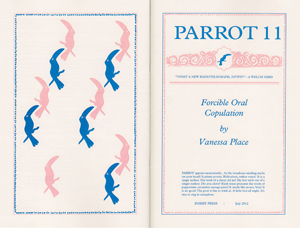
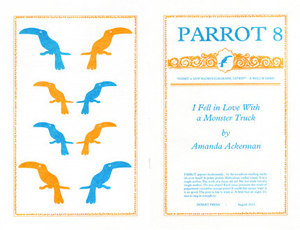
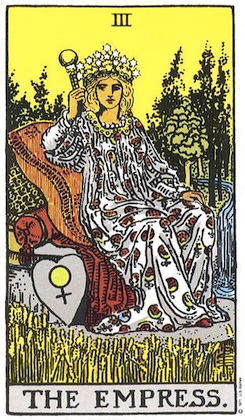


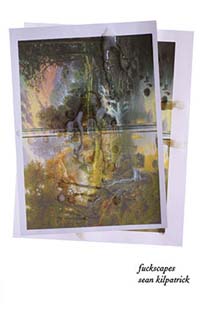 fuckscapes
fuckscapes